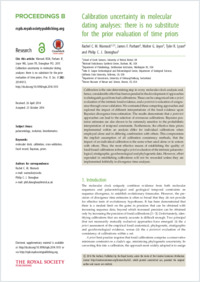Calibration uncertainty in molecular dating analyses: there is no substitute for the prior evaluation of time priors
- Warnock, Rachel C. M. School of Earth Sciences, University of Bristol, Bristol, UK - National Evolutionary Synthesis Center, Durham, USA - Department of Paleobiology, Smithsonian Institution, Washington, USA
- Parham, James F. John D. Cooper Archaeological and Paleontological Center, Department of Geological Sciences, California State University, Fullerton, USA
- Joyce, Walter G. Department of Geosciences, University of Fribourg, Switzerland
- Lyson, Tyler R. Denver Museum of Nature and Science, Denver, USA
- Donoghue, Philip C. J. School of Earth Sciences, University of Bristol, Bristol, UK
-
07.01.2015
Published in:
- Proceedings of the Royal Society of London B: Biological Sciences. - 2015, vol. 282, no. 1798, p. 20141013
English
Calibration is the rate-determining step in every molecular clock analysis and, hence, considerable effort has been expended in the development of approaches to distinguish good from bad calibrations. These can be categorized into a priori evaluation of the intrinsic fossil evidence, and a posteriori evaluation of congruence through cross-validation. We contrasted these competing approaches and explored the impact of different interpretations of the fossil evidence upon Bayesian divergence time estimation. The results demonstrate that a posteriori approaches can lead to the selection of erroneous calibrations. Bayesian posterior estimates are also shown to be extremely sensitive to the probabilistic interpretation of temporal constraints. Furthermore, the effective time priors implemented within an analysis differ for individual calibrations when employed alone and in differing combination with others. This compromises the implicit assumption of all calibration consistency methods, that the impact of an individual calibration is the same when used alone or in unison with others. Thus, the most effective means of establishing the quality of fossil-based calibrations is through a priori evaluation of the intrinsic palaeontological, stratigraphic, geochronological and phylogenetic data. However, effort expended in establishing calibrations will not be rewarded unless they are implemented faithfully in divergence time analyses.
- Faculty
- Faculté des sciences et de médecine
- Department
- Département de Géosciences
- Language
-
- English
- Classification
- Palaeontology
- License
-
License undefined
- Identifiers
-
- RERO DOC 235589
- DOI 10.1098/rspb.2014.1013
- Persistent URL
- https://folia.unifr.ch/unifr/documents/304213
Statistics
Document views: 86
File downloads:
- pdf: 257
